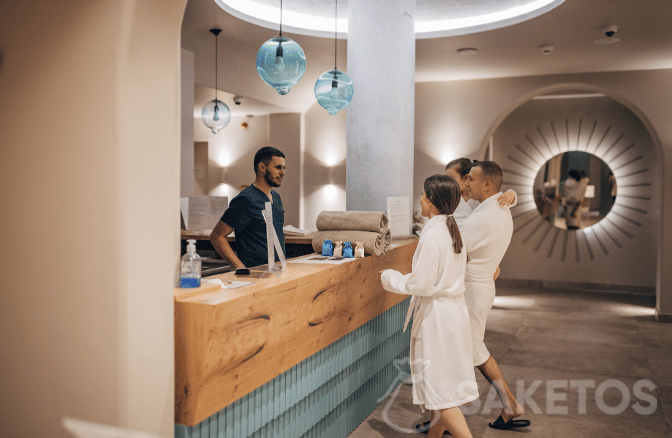In the hotel industry, the first impression of hotel guests is extremely important. One brief moment can determine whether a customer will return to your hotel or recommend the property to their friends. In this post, we present industry best practices used to build a positive first impression.
When we talk about the first impression, we mean the guests’ feelings after their initial contact with the hotel. These impressions are shaped both after virtual contact and during visits to the property. We’ve examined the actions taken by hotels in these areas to encourage guests to return frequently and build a loyal customer base.
The Importance of Guests’ First Impressions for the Hotel Industry
Guest impressions are crucial in the hotel industry, often determining the success or failure of a property. Caring for guests’ positive experiences is truly an investment in building long-term relationships with them and shaping a positive brand reputation. This is extremely important because it directly translates into business success.
The Hotel’s Online Image vs. Guests’ First Impressions
In most cases, it’s not your property itself but rather its website that serves as the first point of contact with a potential guest. Increasingly, opinions about hotels are formed during online accommodation searches. Therefore, it becomes crucial for hotels to focus their attention on building a positive online image and ensuring virtual interactions.
A professional, intuitive website, social media activity, an attractive presence on Google, as well as being listed on booking portals like Booking or TripAdvisor, are elements that contribute to the first, often decisive impression. A carefully prepared presentation of the hotel online increases the likelihood of making a reservation. It also ensures that potential guests form a positive opinion about the brand from their first contact. A good online hotel image is an essential step towards success in the hotel industry.
Using Supplementary Services
The human brain forms opinions within the first few seconds of encountering a new place or person. These initial impressions have a significant impact on subsequent experiences during a hotel stay. The first positive impression builds trust in the hotel brand. It also makes guests more likely to perceive all hotel services as higher quality. A satisfied guest is more inclined to use additional services offered by the hotel, such as restaurants or spas, leading to increased revenue.
The Quality of Hotel Services and Guest Loyalty
Research conducted in hotels belonging to the Orbis Hotel Group clearly demonstrates that customer loyalty and their decisions to revisit a hotel are closely linked to the quality of services provided. Factors such as location, level of service, room standard, cleanliness, hotel atmosphere, and quality of gastronomic services play a key role in shaping guests’ positive experiences.
Investing in high-quality services and attention to details that can influence positive first impressions has become a crucial element of every hotel’s strategy aiming to build and maintain a loyal customer base. Such a strategy is the foundation of long-term success and stability in the competitive hotel market. It is indeed the first impressions that most strongly translate into long-term relationships. Customers satisfied with services show a clear tendency towards loyalty to the hotel or brand – they are more inclined to choose the hotel again in the future.
First Impressions and Positive Online Reviews
Positive reviews that guests post online can have a significant impact on the decisions of other people considering making a reservation. This is especially important in the hotel industry, where competition is high and customers have a wide range of accommodation options to choose from. Satisfied guests whose initial experiences exceeded their expectations are more likely to share their positive opinions online.
An excellent first impression can also mitigate the impact of any minor inconveniences encountered during the stay. Guests who felt exceptional right from the start are more inclined to overlook or understand small issues that may arise later. This, in turn, can reduce the number of negative reviews that deter potential customers.
An exceptional first impression often plays a decisive role in building and developing a business.
Where to start building a positive online image for your hotel?
- Start with the website – make sure it’s intuitive, visually appealing, with up-to-date information and an easy booking system.
- Invest in photos and videos – high-quality visual materials can significantly attract the attention of potential guests and underscore the professionalism of the brand.
- Take care of reviews – encourage guests to share their opinions on Google. Positive comments can attract new customers, and constructive criticism helps in further improving services. Respond to comments and questions, showing that you value guests’ opinions and experiences.
- Improve communication – ensure fast and professional handling of inquiries through all contact channels.
- Be active on social media – regular posts, photos, and interactions can increase visibility and interest in your hotel.
- Platforms like TripAdvisor have become not only a place where potential guests seek recommendations but also a space where hotels can build their reputation.
- Take care of your Google listing. Make sure your Google listing is up-to-date, with accurate address, photos, opening hours, and a link to your website.
- Highlight the location – provide clear and precise information about the hotel’s location and access to local attractions. This is important because location is one of the key factors influencing the choice of a hotel.
- Stand out with amenities – a detailed description of the services offered and amenities tailored to the needs of the target group can attract guests seeking specific experiences.
The First Hotel Visit and Its Impact on Guest Impressions
The first visit to a hotel is crucial for the impressions a guest will take away. Even the first glance at the hotel, before entering its interior, begins to shape opinions about the property. The tidiness of the surroundings, aesthetic exterior appearance, building architecture, and the surrounding landscape – all these elements contribute to a comprehensive image that influences the perception of the standard of services offered.
As guests cross the threshold of the hotel, the reception becomes the place where further impressions are formed. It’s the point where guests begin to form their opinion about the level of service, standards, and the overall atmosphere of the hotel. A well-arranged and managed reception can have a significant impact on positive memories and the overall impression of the stay. We present a few proven practices from the industry that can help ensure that hotel guests’ first impressions are as positive as possible from the moment they arrive at the reception.

The reception influences the first impression of hotel guests. It is here that guests form opinions on the level of service of the hotel.
How to Improve Hotel Guests’ First Impressions During Reception Contact:
-
- Firstly, maintain cleanliness and tidiness at the reception: Regular cleaning and tidiness are essential. Aesthetic appeal and cleanliness are the first things guests will notice when entering the hotel.
- Secondly, tailor the reception decor to the hotel’s standard. Choose decorations and furniture that reflect the level and character of the hotel, creating a cohesive and thoughtful appearance.
- Place fresh flowers and ensure a pleasant scent. Fresh flowers add elegance, while a subtle, pleasant scent can enhance the mood and make the space inviting.
- Choose appropriate background music: Select calm, relaxing sounds that will help guests feel comfortable and welcome.
- Ensure professionalism and friendly communication of reception staff: The first contact with the staff is a crucial moment in defining guests’ experiences. The staff should be well-trained in customer service to provide guests with helpful and friendly assistance. Training employees in communication and customer service is an investment in the hotel’s success.
- Maintain a high standard of service, responding to guest needs: The course of reception procedures affects the level of guest satisfaction. Quick and efficient check-in/check-out is a necessary minimum, and it’s worth introducing automation of guest service processes. Modern hospitality utilises technologies such as offering self-check-in service, enabling guests to check in and out independently. A contemporary hotel should be flexible and ready to adjust its services to guests’ individual expectations.
- Prepare small gifts for hotel guests to pleasantly surprise them at reception. Small gestures, such as local delicacies or small personalized gifts, won’t significantly impact your budget. Starting the stay with a nice touch, such as gifts for hotel guests, helps build a positive first impression.
- Take care of welcome packs for children: Offering special welcome packs for the youngest guests (with toys, crayons, colouring books) shows care. Welcome gifts for the youngest guests make families feel particularly appreciated.

Welcome pack for children – it is also worthwhile to make a good first impression on the youngest hotel guests
The Importance of Personalizing Hotel Services and Hospitality
Service personalization involves tailoring offerings to individual guest preferences. Even the smallest gestures, customized to individual needs, can significantly impact the building of lasting relationships and increasing guest loyalty. An individual approach and offering additional amenities significantly enhance guest satisfaction, making them feel particularly valued.
In modern hospitality, service personalization and personalized hotel services play a crucial role in shaping positive guest experiences. Numerous studies conducted in the hospitality industry confirm the positive impact of personalization on guest satisfaction. It serves as the key to providing guests with memorable experiences and building their loyalty.
Modern Technologies and Personalization
To effectively personalize services, hotels should focus on several aspects. Firstly, they should gather guest information from the moment of booking, paying attention to special requests or room preferences. Utilizing this data, personalized recommendations can be offered – from room selection to restaurant menus to leisure activities suggestions. It’s also important to continuously analyze the collected data and guest feedback. This allows for constant improvement of the services offered and even better alignment with individual expectations.
Utilizing modern technologies such as AI-based management systems proves helpful here, as they analyze data regarding guest preferences and behaviors. Mobile applications offered by the hotel facilitate easy communication with staff, ordering services, making reservations, and also provide information about the hotel and the surrounding area. These apps not only provide easy access to hotel services but also enable guests to personalize their stay in real-time. As a result, guests can enjoy more personalized stays that cater to their individual needs.
Staff Training
In today’s times, when guests expect not only comfort but also personalized experiences during their hotel stays, the appropriate staff training becomes crucial. To meet these expectations, employees must not only be aware of the importance of individualized approaches to each guest but also be able to utilize available technological tools.
Service personalization, utilizing data about customers’ preferences and tastes, allows for tailoring services to the individual needs of each guest. This contributes to increasing their satisfaction and building loyalty towards the hotel brand. Hotel services supported by the latest technological innovations, such as smart room management systems, interactive televisions, mobile applications, or chatbots, become more accessible and convenient for both guests and staff.
Multilingual customer service and regular professional training for employees ensure that every guest, regardless of their background, feels comfortable and understood. High-quality services, individual approach to the customer, and the use of modern technologies make modern hotels increasingly attractive to travelers seeking unforgettable and personalized experiences during their journeys.
Hotel gifts with personalisation
Personalized gifts, specially selected bathroom amenities, individually tailored suggestions for activities in the area, or even small surprises like a bottle of wine for birthdays or anniversaries – all these elements highlight the hotel’s attention to detail and directly contribute to guests feeling appreciated. Such a level of personalization not only makes guests more likely to return to the same hotel but also to recommend it to their friends and family. In the long run, this contributes to building a strong and positive reputation for the hotel brand.
Details and the first impression of hotel guests
In summary, it is worth emphasizing that investing in the quality of the first impression, both in the virtual world and during direct contact with the hotel, is not only about caring for the guest’s immediate experience. It is also about building a positive reputation for the hotel brand and ensuring the success of the hotel property in a broader sense.
It should be remembered that in the hotel industry, it is often the details that determine success. Seemingly small elements can play a crucial role in shaping the first impression and, consequently, the overall perception of the hotel by guests. Attention to details, such as high-quality bedding, small welcome gifts, or room amenities tailored to individual needs, underscores the commitment to providing maximum comfort and shows that every guest is important and valued. Such an approach influences guest satisfaction and their loyalty to the brand.
Focusing on the experiences and needs of visitors, as well as investing in those “little things” that together create a unique atmosphere and allow the hotel to stand out from the competition, is a strategy that brings long-term benefits. The result is satisfied customers and positive reviews, which contribute to building a strong position for the hotel in the market.
Are you curious how our hotel industry clients utilise fabric bags with the hotel logo to create a positive first impression? We invite you to read the article: How are fabric bags with the hotel logo used in the hotel industry?






